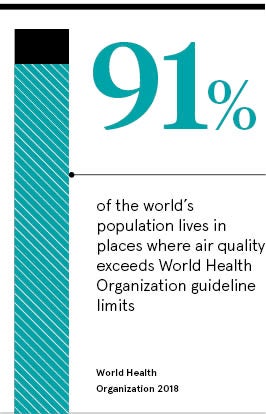Smart inhaler technology is effectively a sensor attached to an existing prescription inhaler, which sends data via Bluetooth to a smartphone application. Most apps claim to alert patients when they enter areas with high air pollution, thus helping asthmatics avoid places that exacerbate the symptoms of their condition.
FindAir launched Europe’s first commercially available smart inhaler earlier this year, but the technology is still not available on the NHS. Asthma UK has been pushing for testing and it’s now been recommended in the NHS Long-Term Plan. But according to the charity, there is still an existing research gap associated with the technology.
With an insufficient number of studies to confirm accuracy, robustness, user experience and clinical outcomes, alongside uncertainty around the procedure for approving UK digital health technology, there is no telling if smart inhalers will be rolled out tomorrow, in ten years or ever.
Can a mask really protect you from air pollution?
A staple of ordinary life in the smog-filled city of Beijing, respirators, or air pollution masks, are one of the up-and-coming air pollution solutions gradually broadening their scope in the global market. Designed to filter out nasty pollution particles, masks are being sold as a way to reduce the damaging effects of living in highly polluted cities.
 The best masks filter out almost 100 per cent of particulate matter. This includes PM2.5, the most dangerous pollution particle. It’s much thinner than a human hair and can pass through the lungs and into the bloodstream.
The best masks filter out almost 100 per cent of particulate matter. This includes PM2.5, the most dangerous pollution particle. It’s much thinner than a human hair and can pass through the lungs and into the bloodstream.
But the British Lung Foundation says there isn’t enough evidence to recommend the use of these masks, while medical experts at Asthma UK claim there’s no proof wearing one makes any difference to asthma symptoms.
“For people with a lung condition, who already struggle to breathe, wearing a military standard mask would make breathing even harder,” says Alison Cook, director of policy at the British Lung Foundation.
Although many companies claim their masks can filter out harmful pollutants, the evidence on which these claims are based often comes from lab-based studies with controlled conditions, rather than real-life testing, she says.
Christopher Dobbing, founder of Cambridge Mask Co, says his masks have military-grade filtration, scientifically proven to reduce the harmful impact of pollution. Contrary to advice by the British Lung Foundation, he says Cambridge Mask is supported by a healthcare specialist that regularly recommends the technology to asthmatics and those with other respiratory conditions.
Air pollution is just as much of a threat indoors as outdoor
Studies about the impact of pollution on our health have existed for decades. But this research has largely focused on ambient, or outdoor, air where governments are responsible for enforcing pollution policies. But there is little awareness about the existence or impact of indoor pollution.
“Our homes, rather than being a refuge from outdoor pollution, can be up to five times more polluted than outdoors,” says Evan Stevens, head of category, environmental control at Dyson.
Some 3.8 million deaths every year are caused by household exposure to smoke from dirty stoves and fuels, according to the World Health Organization.
Leading the way for air pollution solutions in the home are air purifiers. Dyson makes machines that capture tiny particles like pollen and use carbon household fumes like volatile organic compounds.
However, whether or not the technology actually improves health in day-to-day life is inconclusive. Although these machines are proven to trap 99.95 per cent of ultrafine particles, they are sold to support wellbeing and are not certified for medical use.
The public are no strangers to split opinion or an absence of definitive proof about the effectiveness of some products. Take the claimed link between wine and long-life versus evidence that it causes serious illness, or uncertainty about the value of vitamin supplements. Left in limbo once again, questions about the efficacy of these air pollution solutions remain unanswered.
Can a mask really protect you from air pollution?

